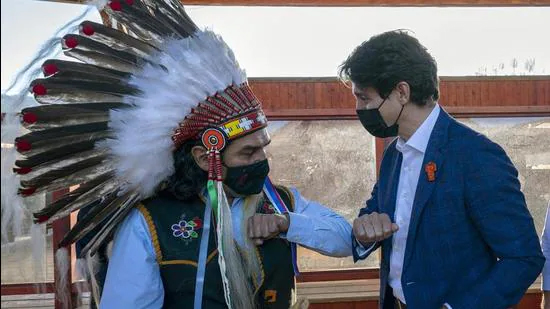Canadian Prime Minister Justin Trudeau apologised in person before an indigenous gathering in the province of British Columbia for having gone on vacation when the country marked its first National Day for Truth and Reconciliation on September 30.
Trudeau visited the Tk’emlups te Secwepemc Nation community and held a press conference with its chief Rosanne Casimir. This First Nations band is close to Kamloops in British Columbia where 215 unmarked graves of indigenous children were discovered last summer, followed by several other similar findings.
Referring to his decision to go on holiday on September 30, Justin Trudeau said, “It was a mistake and I understand that it made a very difficult day even harder.”
The day was made a national holiday by the Trudeau government itself earlier this year.
He faced flak from the indigenous community for choosing to go vacationing on the date that commemorated the tragedy faced by children of the erstwhile residential school system.
As that day was observed at the end of last month, Justin Trudeau’s official schedule stated he was having private meetings in Ottawa. However, he had actually flown to the resort of Tofino, also in British Columbia, for a family holiday and filmed on a beach by the outlet Global News. His office later updated his itinerary with the holiday
His move drew criticism in Canada from various indigenous groups such as the Native Women’s Association of Canada (NWAC). It issued a statement on Friday expressing “shock and dismay” over Trudeau holidaying in Tofino. NWAC CEO Lynne Groulx said the “decision to duck out entirely” on this particular day was “astounding for its sheer level of callousness”.
On Monday, Casimir appeared to accept the apology even as she scolded Justin Trudeau over rejecting invitations from the indigenous community and choosing to holiday – even as he looked on.
She said, “The shock, anger and sorrow and disbelief was palpable in our community.” However, she said, his appearance on Monday was “about making some positive steps forward and rectifying a mistake”.
Emotions over the controversial treatment of Canada’s indigenous people have been high this year due to a series of discoveries of hundreds of unmarked graves of children at or close to the location of residential schools that were operated by the Catholic Church from the mid-19th century into the 1970s.
Last summer in Canada, 182 such graves were found near the town of Cranbrook in British Columbia, 751 in Saskatchewan and 215 in Kamloops, also in British Columbia.

